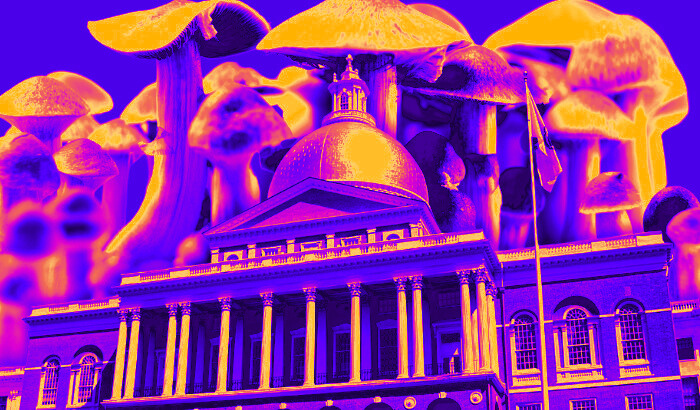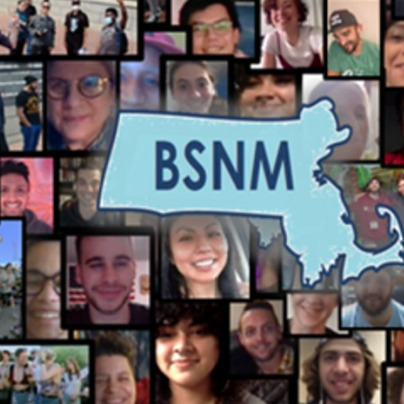
“This is a call to action for plant medicine advocates to share their powerful stories of healing and hope.”
Ed. Note: While Talking Joints Memo is focused on cannabis culture and products, we also see that psychedelics are the next theater in the war to end the War on Drugs. The movement is very much underway already, as the volunteer network Bay Staters for Natural Medicine (BSNM) has successfully pushed efforts to decriminalize psychedelic plants in Somerville, Cambridge, Easthampton, Northampton, and Salem, with various similar efforts underway elsewhere. BSNM currently has multiple pieces of legislation filed in the Massachusetts legislature, and to help walk readers through them we asked the group’s board to summarize them in brief. This is the most recent post outlining their efforts on Beacon Hill.
Six Massachusetts communities—Somerville, Cambridge, Northampton, Easthampton, Amherst, and Salem—have voted to recognize the benefits of psilocybin mushrooms, a naturally-occurring psychedelic that the U.S. Food and Drug Administration (FDA) has approved as a “breakthrough therapy” for depression. Instructing their police departments to make arrests against growing and sharing psilocybin as well as the related plant medicines ayahuasca, mescaline, and ibogaine, these cities have paved the way for the Joint Committee on the Judiciary to hold its first hearing on An Relative to Plant Medicine (H1754 / S1009).
The hearing this upcoming Tuesday will give advocates a chance to make the case for legislation that would allow adults to grow and non-commercially share naturally-occurring psychedelic plants without fear of arrest. Currently, adults found growing these plants could face 10 years in jail in Massachusetts, even as states like Oregon and Colorado have legalized them with strong public support.
Preparing to testify at the committee hearing will be several established advocacy organizations, including Bay Staters for Natural Medicine whose volunteers passed the local measures.
“It’s absolutely critical that we educate the public about the benefits for mental health and addiction,” said James Davis, the co-founder of Bay Staters for Natural Medicine and former legislative staffer on Beacon Hill. “In the course of this hearing, nearly eight of our neighbors in Massachusetts will have lost their lives to overdose. We will not tolerate another year of our loved ones succumbing to opioids when we have these affordable, transformative medicines for addiction and trauma that grow straight from the Earth.”
Advocates cite a recent study of 44,000 Americans in the U.S. Journal of Psychopharmacology has found that a single use of psilocybin mushrooms is associated with a 40% reduced risk of opioid use disorder—a finding backed by a 2021 study suggesting an even stronger effect. Following in the footsteps of Kentucky, which just invested $42 million into piloting the plant psychedelic ibogaine, the legislation would allow residents to access this medicine in small quantities. Countries like Costa Rica and New Zealand have legal access to the medicine, which resets addiction neuroreceptors related to alcoholism and opiate withdrawal.
“The VA had me on over 100 medications for my post-traumatic stress after the Gulf War,” said Michael Botelho, a U.S. Marine Corp Veteran and co-founder of New England Veterans for Plant Medicine. “These drugs were addictive, and they destroyed my life. With just two grams of psilocybin mushrooms, my life was saved. I could get up. I could work. If they don’t pass this bill, the message is that it’s okay to let vets and first-responders die, if I may be honest.”
“This is a call to action for plant medicine advocates to share their powerful stories of healing and hope,” added Rep. Nicholas Boldyga, who is supporting the legislative push with his experience in law enforcement. “It’s critical that members of the Judiciary Committee hear from veterans, first responders, clinicians, mental health professionals, and the countless others whose lives have been transformed.”
Mental health is a top priority for a lot of elected officials across the state, and naturally occurring psychedelics offer a path forward. A recent meta-analysis of randomized clinical trials dating back two decades found that psychedelic-assisted counseling is highly effective in treating depression and trauma. For patients with a terminal illness, double-blind trials show a single dose of psilocybin mushrooms can substantially reduce long-term anxiety and depression with a nearly 80% clinical response rate.

























